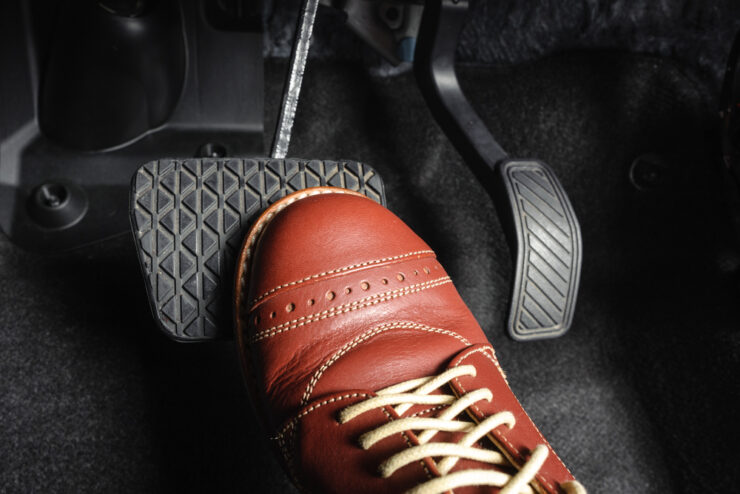Ever had that mini-heart attack when you hit the brakes, and your car decides it’s a good time to play ‘hard to get’? Not fun, right? Well, brakes are one of the most important parts of our cars, and when they start acting up, it’s no laughing matter.
So, let’s talk about this problem – I promise to keep it light and easy to understand, don’t worry.
Key Takeaways
- Brake failure can often be attributed to worn brake pads and shoes, leaking brake fluid, overheated brake components, and warped rotors.
- Also, faulty brake lines or hoses, air in the brake lines, and a worn or faulty master cylinder can cause the same problem.
- These issues can lead to decreased braking power, longer stopping distances, and in severe cases, complete brake failure.
1. Worn Pads and Shoes
Brake pads and shoes are the heart of your vehicle’s braking system. They provide the necessary friction to slow down or stop your car. Over time, this friction material wears down, diminishing its ability to halt your vehicle effectively.
Ignoring worn pads can lead to metal-on-metal contact, which not only damages your rotors but also significantly reduces your car’s stopping power.
How to Solve This?
Regularly inspect your pads and shoes for wear. Most pads have wear indicators that produce a squealing noise when they need replacing. As a rule of thumb, these pads should be replaced if the pad thickness is less than 1/4 inch (about 6 mm).
2. Leaking Fluid
Brake fluid is the lifeblood of the hydraulic braking system. A leak in this system can lead to a loss of braking power, as there is not enough hydraulic pressure to press the pads against the rotors. Leaks can occur anywhere in the braking system, including the master cylinder, brake lines, or calipers.
Solution
Check your fluid levels regularly and inspect for signs of leakage under the vehicle or near the wheels. If you notice a drop in fluid levels or spot a leak, it’s crucial to have your vehicle inspected and repaired by a professional immediately.
3. Overheated Brake Components
Excessive use of brakes, especially during long descents or in heavy traffic, can lead to overheating. Overheated brakes may lose their ability to create friction, leading to what’s known as brake fade. This can dramatically increase stopping distances and, in extreme cases, lead to total brake failure.
Solution
Avoid riding your brakes and try to anticipate stops to reduce their usage. If you’re driving in hilly terrain, use engine braking by downshifting instead. If you suspect your brakes are overheating, pull over safely and allow them to cool before continuing.
4. Warped Rotors
Brake rotors can warp from excessive heat or from being subjected to extreme stress, such as towing heavy loads. Warped rotors cause a pulsating feeling in the b pedal and uneven pad wear, leading to decreased braking efficiency.
How to Solve This?
If you experience pulsation when braking, have your rotors checked for warping. In some cases, they can be machined back to a flat surface, but often, replacement is the best solution.
5. Faulty Lines or Hoses
Brake lines and hoses can become brittle, cracked, or corroded over time. This can lead to leaks or blockages, reducing the amount of hydraulic pressure that can be applied to the pads or shoes.
Solution
Regularly inspect your brake lines and hoses for signs of wear or damage. Replace any damaged parts immediately. It’s also a good idea to have your fluid flushed and replaced at intervals recommended by your vehicle’s manufacturer.
6. Air in the Lines
Air in the brake lines can significantly reduce the effectiveness of your braking system. Since air can be compressed, unlike fluid, it leads to a spongy or soft pedal feel and decreased braking power.
How to Solve This?
If your pedal feels spongy, have your braking system bled to remove any air from the lines. This process involves forcing brake fluid through the system to push out any trapped air bubbles.
7. Worn or Faulty Master Cylinder
The master cylinder is responsible for converting the force from the brake pedal into hydraulic pressure. If it’s worn or faulty, it can fail to provide the necessary pressure to engage the brakes properly.
Solution
Symptoms of a failing master cylinder include a sinking pedal or decreased braking power. If you suspect your master cylinder is failing, have it inspected and replaced if necessary.
FAQs
Can weather conditions affect my brake’s performance?
Absolutely! Extreme cold can lead to brake fluid thickening, reducing its effectiveness, while extreme heat can cause components to expand and potentially fail.
How often should I check my brake fluid level?
It’s a good idea to check your fluid level every time you get an oil change, or at least every six months.
Can I still drive my car if I hear a squeaking noise from the brakes?
While a squeaking noise doesn’t always signal an immediate danger, it’s a warning sign that your brakes need to be checked. It’s better to be safe and have them inspected as soon as possible.
Is it more expensive to repair or replace warped rotors?
It can vary, but generally, if the rotors are significantly warped, replacing them might be more cost-effective than trying to repair them.
How can I tell if my brake lines are corroded?
Look for signs of rust or fluid leakage under your car or near the wheels. If you see any suspicious signs, it’s time for a professional inspection.
What should I do if my brake pedal suddenly goes to the floor?
If your pedal suddenly feels very soft or goes to the floor, try pumping it to build up pressure. If that doesn’t work, use your emergency brake to stop safely, and call for assistance. Don’t continue driving as it’s a serious safety risk.
Final Words
Keeping your car’s brakes in tip-top shape isn’t just about avoiding repair bills; it’s about making sure you and everyone else on the road get to where they’re going safely. Think of their maintenance like dental check-ups: a bit of a hassle, sure, but way better than the alternative.
Stay safe, check those brakes, and here’s to smooth (and quick) stops in your future!

